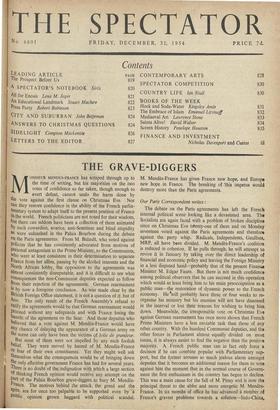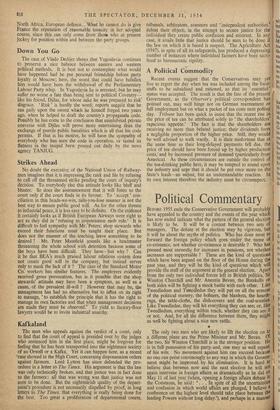THE GRAVE-DIGGERS
MONSIEUR MENDES-FRANCE has scraped through up to the time of writing, but his majorities on the two votes of confidence so far taken, though enough to avert defeat, cannot undo the harm done by the vote against the first clause on Christmas Eve. Nor can they restore confidence in the ability of the French parlia- mentary system to adapt itself to the present position of France Inthe world. French politicians are not noted for their wisdom, but there can seldom have been a collection of them animated by such cowardice, avarice, anti-Semitism and blind stupidity as were unleashed in the Palais Bourbon during the debate on the Paris agreements. From M. Bidault, who voted against Policies that he has consistently advocated from motives of Personal antagonism to the Prime Minister, to the Communists, Who were at least consistent in their determination to separate Prance from her allies, passing by the alcohol interests and the North African lobby, The opposition to the agreements was almost consistently disreputable, and it is difficult to see what consequences the non-Communist deputies expected to follow !tom their rejection of the agreements. German rearmament IS by now a foregone conclusion. As was made clear by the British Foreign Office statement, it is not a question of if, but of how. The only result of the French Assembly's refusal to ratify the agreements would be that German rearmament would Proceed without any safeguards and with France losing the benefit of the agreement on the Saar. And those deputies who believed that a vote against M. Mendes-France would have any chance of delaying the appearance of a German army on the scene can only have been the victims 9f folie de grandeur. But most of them were not impelled by any such foolish belief. They were moved by hatred of M. Mends-France Or fear of their own constituents. Yet they might well ask themselves what the consequences would be of bringing down the only effective government France has had for several years. There is no doubt of the, indignation with which a large section Of thinking French opinion would receive any attempt on the 12.art of the Palais Bourbon grave-diggers to bury M. Mendes- trance. The motives behind the attack, the greed and the spite, are for once too palpable to be supported even by a Public opinion grown haggard with political scandal. M. Mendes-France has given France new hope, and Europe new hope in France. The breaking of this impetus would destroy more than the Paris agreements.
Our Paris Correspondent writes : The debate on the Paris agreements has left the French internal political scene looking like a devastated area. The Socialists are again faced with a problem of broken discipline since on ,Christmas Eve tWenty-one of them and on Monday seventeen voted against the Paris agreements and therefore against the party whip. Radicals, Independents, Gaullists, MRP, all have been divided. M. Mendes-France's coalition is reduced in cohesion. If he pulls through, he will attempt to revive it in January by taking over the direct leadership of financial and economic policy and leaving the Foreign Ministry in a less disputed hand—probably that of the present Finance Minister M. Edgar Faure. But there is not much confidence among political observers that he can succeed in this operation which would at least bring him to his main preoccupation as a public man—the restoration of dynamic power to the French economy. Hewill probably have three or four weeks to re- organise his ministry but his enemies will not have disarmed in the interval or lost their reasons for wishing to bring him down. Meanwhile, the irresponsible vote on Christmas Eve against German rearmament has once more shown that French Prime Ministers have a less enviable task than those of any other country. With the hunc4ed Communist deputies, and the other forces in Parliament almost equally divided on most issues, it is always easier to find the negative than the positive majority. A French public man can in fact only force a decision if he can combine popular with Parliamentary sup- port, but the former arouses so much jealous alarm amongst deputies that it becomes an additional reason for them to vote against him the moment that in the normal course of Govern- ment the first enthusiasm in the country has begun to decline. This was a main cause for the fall of M. Pinay and is now the principal threat to the abler and more energetic M. Mendes- France. In six months of office he has advanced a number of France's gravest problems towards a solution—Indo-China, North Africa, European defence. What he cannot do is give France the reputation of reasonable tenacity in her adopted course, since this can only' come from those who at present jockey for position within and between the party groups.



























 Previous page
Previous page